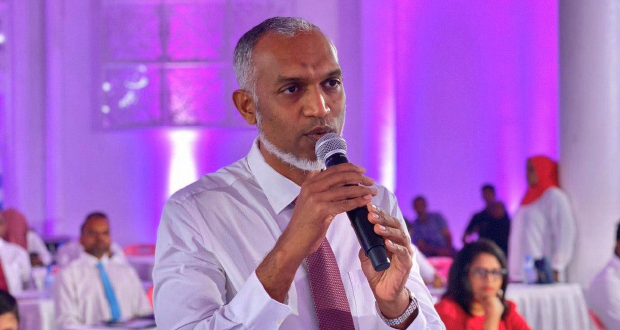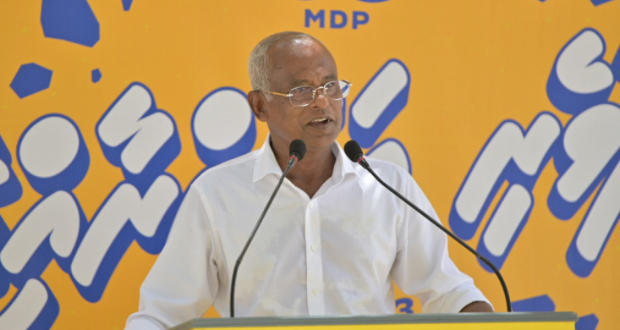Publicité
Indian Ocean
The Maldives’ presidential elections spell bad news for Mauritius
Par
Partager cet article
Indian Ocean
The Maldives’ presidential elections spell bad news for Mauritius

The presidential contest in the Maldives has proceeded to a second round scheduled for 30 September.
The first round of voting in the Maldivian presidential elections has come as a major setback for incumbent president Ibrahim Solih. As the country heads into a second round to determine who will be the next President, here’s why this is bad news for Mauritius and its prospects of finally settling its territorial disputes with Malé.
1. The setback for Solih
The Maldivian presidential elections have come as a major setback for incumbent President Ibrahim Solih, who sought a second term. Solih managed to get second place with 39.5 percent of the votes, compared to Dr. Moahmed Muizzu, the candidate of the opposition PPM-PNC coalition, who managed to bag 46.6 percent. With neither managing to get the required 50 percent to secure the presidency, the polls are now going into a second round which will take place on 30 September.
This has left both Solih and Muizzu now looking to cobble together alliances in order to win at the second round of the presidential poll. One clear winner so far has been former President and parliamentary speaker Mohamed Nasheed, who has been leading an anti-Solih revolt within the ruling MDP party. Nasheed’s bet seems to have paid off in the first round.
Starting in 2020, Mohamed Nasheed has led a revolt against Ibrahim Solih from within the ruling party and has been positioning himself as a challenger to Solih. Back in January, Nasheed challenged Solih in a bitter primary within the MDP to become its presidential candidate in the elections but lost out to Solih – with the President getting 24,566 votes within the MDP compared to Nasheed’s 15,641.
Nasheed reacted by first setting up a separate faction within the MDP and splitting its parliamentary contingent, before his supporters officially leaving the MDP to found a new party: ‘The Democrats’. Nasheed embarked on a complex strategy, getting his supporters to leave the MDP and weaken Solih, while at the same time reaching out to the opposition parties. Most notably, by asking the EU to pressure Solih to convert former President’s Abdulla Yameen’s 11-year prison sentence into house arrest.
At the same time, Nasheed did not formally stand as a candidate himself in the presidential elections, preferring to have another loyalist Ilyas Labeeb stand as the candidate for the democrats, with Nasheed not standing directly against his old party, the MDP, in an election, that leaves the door open for a weakened MDP to come back to him for a coalition to keep the opposition PPM-PNC out of power.
And that is precisely what has happened. Coming in second in the first round of the presidential polls, Solih’s MDP has now reached out to Nasheed’s democrats, who got 15 percent of the vote, and whose backing would be crucial to keep the MDP in power for another term. After Solih finishing second in the first round of the presidential polls, last Monday, the MDP formally withdrew a no-confidence motion that it had lodged in June to unseat Nasheed as speaker, and his key ally Eva Abdulla as deputy speaker in parliament.
The Minister for economic development and the MDP’s party chairman and Solih loyalist, Fayyaz Ismail, stated that the MDP was now looking to ally with Nasheed in the second round of the presidential elections to help keep it in power.

Mohamed Muizzu, Mayor of Malé City and the opposition PPM-PNC candidate, has emerged as the front-runner, taking the lead over incumbent President Ibrahim Solih (below) of the MDP.

2. Trouble brewing for Mauritius
Solih’s MDP looking to bury the hatchet with Nasheed and bring him back into the government for a second MDP term is not good news for Mauritius. Both Mauritius and Maldives have been embroiled in a maritime territorial dispute at the International Tribunal of the Law of the Sea (ITLOS). Recently, Solih’s government decided to recognize Mauritian sovereignty over the Chagos islands, paving the way for the ITLOS to split a contested 95,000 square kilometer maritime zone between the two states. Nasheed has opposed Mauritian sovereignty over the Chagos islands, making the argument that since Mauritius hands out fishing licenses to foreign states, the waters of the Chagos coming under Port-Louis’ control would lead to overfishing.
A key Nasheed loyalist, Ibrahim Rasheed, accused the Solih government of accepting a $500 million bribe from “foreign fishing companies” to recognize the Chagos islands as Mauritian. While Nasheed himself has gone much further and cited letters from Maldivian monarchs as early as 1560 to argue that parts of the Chagos islands themselves – such as Peros Banhos – belong to the Maldives archipelago. Since the ITLOS decision to split the maritime zone between the two countries, Nasheed has also urged the Maldivian government to effectively ignore the ITLOS decision and continue to act as if Maldives controls the zone.
If Nasheed has had a problematic stance for Mauritius over the maritime boundaries between the two states, the opposition PPM-PNC has not been much better either. The mayor of Malé City, Muizzu, became the presidential candidate of the opposition alliance only after the Election Commission and the Supreme Court in the Maldives ruled that former President Yameen was ineligible to stand as a candidate owing to his 11-year prison sentence over corruption and money laundering (that Yameen is currently appealing).
Like Nasheed, the PPM-PNC too has looked to raise nationalist anger over the maritime boundary issue against Solih. While it has gone to the lengths of Nasheed to come up with a new sovereignty claim over the Chagos, the opposition bloc has opposed both countries agreeing to split the disputed maritime boundary in line with the ITLOS decision, accusing Solih of “giving away” waters that should belong to the Maldives. If Nasheed’s loyalists had Solih for corruption, the PPM-PNC demanded that the Maldivian government makes public an August 2022 letter where the Solih government informed the Mauritian government that it was recognizing the Mauritian claim over the Chagos.
Since the first round of voting was completed last weekend, a copy of the letter has been leaked online (and confirmed as genuine by a spokesman for the Maldives’ presidency). The letter itself simply stated that the Solih government was changing its stance at the UN to back Mauritius, that was doing so “entirely without prejudice to the legal position taken by Maldives” at the ITLOS or its 2010 submission to the Commission on the Limits of the Continental Shelf (CLCS), and that the Solih government would support any future expedition by Prime Minister Pravind Jugnauth to the Chagos. Previously, Mauritius had to route its scientific expedition to the Chagos in 2022 through Seychelles after it accused Maldives of imposing “unacceptable conditions” on allowing the Mauritian expedition to leave from Maldives.
3. A deal off the table… for now
The Solih government embarked on a bold move to recognize Mauritian sovereignty over the Chagos and agree to split a contested maritime zone with Mauritius through the ITLOS because that opened the door to settling the one outstanding issue with PortLouis: that of the continental shelf. In July 2010, the Maldives made a submission to the CLCS claiming a 165,966 square kilometre continental shelf straddling the Chagos islands after it rebuffed Mauritian suggestions that both states put in a joint submission as Port-Louis had done with Seychelles.
Although in March 2019, Mauritius claimed a 175,000 square kilometre continental shelf south of the Chagos islands, it did not make any formal submissions on the northern Chagos because of its ongoing dispute with the Chagos. However, failing to reach a deal with Maldives, on 25 May 2021, Mauritius filed a preliminary information at the CLCS claiming a 23,400 square kilometre continental shelf zone, overlapping with the Maldivian claim. At the ITLOS, Mauritius wanted to settle this question of the continental shelf as well as that of the maritime boundary. However, the ITLOS refused to do so, leading Mauritius to formally submit its claim to the CLCS in April 2022.
Solih’s concessions at the United Nations and the ITLOS were in recognition of some stark international realities. International public and judicial opinion are solidly behind Mauritius over its ownership of the Chagos and that relying on the CLCS to resolve the dispute over the continental shelf is not an option: the CLCS is a technical body unable to settle sovereignty questions. To settle that both states would either have to get into a new legal fight at the ITLOS or the International Court of Justice, or come to a deal themselves. What Solih did was allow for this second possibility and raising the prospect of finally settling all boundary disputes between Mauritius and Maldives once and for all as well as opening up the possibility for Maldives to pursue membership in regional organizations such as the Indian Ocean Commission.
For Mauritius, the best outcome would have been a strong second Solih presidency that would allowed Malé some room to proceed along these lines and finally settle the continental shelf dispute with Port-Louis, allowing both states to deepen their relationship and strengthening Mauritius’ hand in dealing with the United Kingdom in its talks on the Chagos islands by removing disputes with the Maldives as a potential complicating factor that London could use.
However, after the first round of voting in the Maldivian presidential elections, two distinct possibilities have emerged: either Solih and the MDP win back the presidency, but relying on support of Nasheed who will be eager to use this second term to further undercut an already-weakened Solih to pave the way for Nasheed to eventually once again take control of the MDP. This makes it virtually impossible for Solih to potentially alienate Nasheed and his supporters by continuing down the road to an accommodation with Mauritius. The other possibility is the PPM-PNC combine throwing Solih and the MDP from power entirely, bringing any deal that Solih was thinking of cutting with Mauritius over the continental shelf to a screeching halt.
In either possibility – should Solih succeed in convincing Nasheed in backing him for a second presidential term to keep the PPM-PNC out of power, or should the PPM-PNC bloc succeed in winning the presidency –, for Mauritius, the news out of the first round of presidential voting has been bad. And what it points to is that any hopes that Mauritius may have had in reaching a deal with the Maldives in resolving the one remaining bilateral issue over the continental shelf is off the table. At least for now…
Publicité
Publicité
Les plus récents






